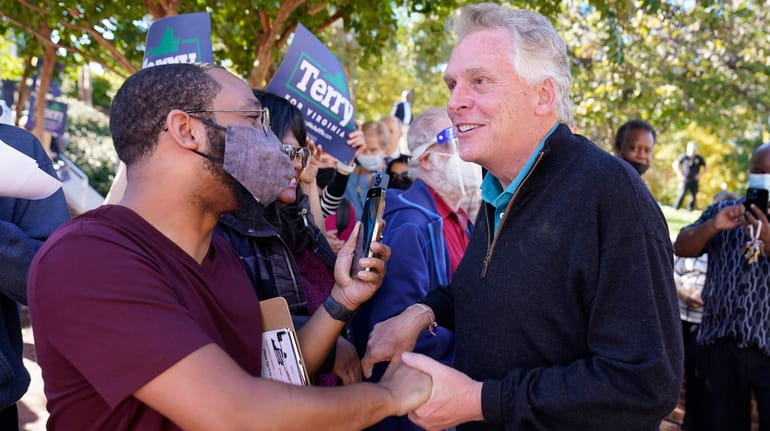Is the pendulum swinging again?

Former Gov. Terry McAuliffe, right, a Democrat, greets supporters during a rally in Lynchburg, Viginia, Wednesday. McAuliffe faces Republican Glenn Youngkin in the November gubernatorial election. Credit: AP/Steve Helber
Tuesday's gubernatorial contest in Virginia, pitting former governor and Democratic Party stalwart Terry McAuliffe against upstart Republican businessman Glenn Youngkin, is irresistible bait to those suffering the prognostication bug.
There aren’t a lot of big races in off-years typically, and this one may be a bellwether for next year’s midterms which will decide whether Democrats hold onto both houses of Congress in the final two years of President Joe Biden’s term. Expect to hear a lot about this race Tuesday night and in the days that follow.
As of now, if you believe pollsters, the Virginia race is a dead heat. It shouldn’t be in this tense national political environment. That’s what makes it so interesting. Biden won the commonwealth by 10 points last November — Democrats have won Virginia in every presidential election since 2008 — and the party controls every branch of state government in the Old Dominion. How is a seasoned political pro like McAuliffe trailing in some polls?
It’s a lot of things arguably — McAuliffe’s lackluster campaign vs. Youngkin’s smart one; Biden’s faltering agenda (on the heels of an optically disastrous withdrawal from Afghanistan); inflation, particularly at gas pumps; unpopular COVID-19 mandates; and culture battles over what's taught in schools, among others. But it’s something overarching, too, possibly, and that’s what has this observer most interested.
It appears that maybe — just maybe — the natural political pendulum is beginning to swing again in the U.S., which would be welcome news for Republicans in blue states like New York who’ve been pummeled at the ballot box for the past five years. It would mean some normalcy is returning to American politics after a half decade talking about one man. Actual issues may be in play again, and on issues Republicans can win.
The political pendulum typically swings after one party dominates a national election. Activists on the winning side take a breather — many of their leaders go into government — while opposition to the party in power grows organically. Promises made before elections never quite pan out, and swing voters start thinking of hedging their bets the next time they're in the voting booth.
We’ve seen the same cycle at the national level for generations. Lather, rinse, repeat.
But former President Donald Trump threatened to disrupt the wash. He's so divisive that Democrats needed only whisper his name in recent years to torpedo state and local GOP candidates in blue states. The suburbs, especially, have been a killing field. Their highly motivated anti-Trump voters erased New York’s Republican majority seemingly overnight.
Virginia was transformed from a deep red state to a reliably blue one as a direct result of its rapid suburban growth in recent decades, particularly along its northern border with Washington, D.C. (The region is often referred to as NOVA, and not always kindly.) If Youngkin wins, or even runs close, it may mean that highly educated suburban voters are in play again going into 2022, or, at a minimum, that they’ve lost some of their anti-GOP zeal. Either would be a big deal, especially since McAuliffe has spent most of his resources trying to tie Youngkin to Trump, while Trump also has been trying to bind himself to the popular Virginia Republican.
Youngkin rebuffed both efforts, and that may create a road map for candidates here next year.
U.S. politics may finally be moving on.
Opinions expressed by William F. B. O’Reilly, a consultant to Republicans, are his own.

